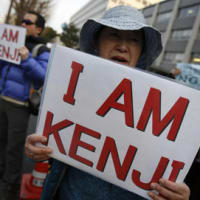Brazil Hopes To Add Oil Wealth To Booming Economy
ブラジルは好調経済に石油の富の上乗せを期待
好調な経済発展をとげているブラジル。2014年にはワールドカップ、2016年にはオリンピックと見通しは明るい。この国がかつてデフォルトの寸前までいった国とは思えない発展ぶり。油田の発見、エタノールも追い風になっている。 日本もまだまだいける!
by Alan Greenblatt

Brazil's energy company, Petrobras, inaugurated a new offshore platform on June 3 in Angra dos Reis. Brazil has located major offshore oil fields and plans to greatly increase production in the coming years. ブラジルのエネルギー会社、ペトロブラスがアングラ・ドス・レイスで7月の3日、新しい沖合石油基地の操業を開始した。 ブラジルは主要な大陸棚沖合の油田を発見し、これから数年にわたり増産に拍車をかける計画である。
September 7, 2011
When people say Brazil won't be the next Saudi Arabia, they mean it in a good way.
Brazil has discovered enormous oil reserves far off its coast, but the country's robust and varied economy means it shouldn't become dependent on oil.
"Brazil is not just going to be an oil-exporting country," says Paulo Sotero, director of the Brazil Institute at the Woodrow Wilson Center for International Scholars. "That's not all it's going to do."
人々がブラジルは次のサウジアラビアにはならないと言う時、それはいい意味でそう言っている。 ブラジルは巨大な石油資源を、かなり離れた沖合に発見したが、ブラジルの逞しく、かつ多彩な経済は石油依存体質にはならないと思われていた。
「ブラジルは単に石油輸出国ではないし、それが今やろうとしている全てではない。」と、国際学者のためのウッドロー・ウィルソンセンターにあるブラジル研究所の長であるパウロ・ソテロは話す。
Brazil now has the ninth-largest economy in the world and has enjoyed enormous growth in recent years, thanks in part to the export of a wide array of commodities to China, its largest trading partner.
Oil, of course, is an especially valuable commodity to sell, and Brazil now has lots of it. The discovery in 2007 of an oil field the size of Florida in the Atlantic Ocean signaled Brazil's emergence as a major energy player.
ブラジルは、いまや、最大の貿易相手国である中国への広範な商品群の輸出にも支えられて、大きな経済成長を遂げている、世界で9番目の経済大国となった。
もちろん、石油は特に価値のある輸出商品であり、ブラジルはいま多くを保有している。 大西洋においてフロリダに匹敵する規模の油田を2007年に発見したことは、ブラジルが主要なエネルギー産出国として台頭したことを意味する。
Oil's For Fighting Over 取り組んで努力する油田
Estimates of the amount of oil resting under a layer of salt have ranged as high as 123 billion barrels. Even much more conservative estimates of 15 billion barrels would double the country's proven reserves.
Given the difficulties of extracting oil 200 miles out to sea, Brazil will never be able to recover all the oil that's out there. But whatever the amount, it seems it's worth fighting over.
海底油田の埋蔵量は1230億バレルと見積もられている。 もっと控えめな見積もりでも150億バレルで、既に国内で見つかっている埋蔵量の倍となる。
200マイルもの沖合の海底から石油を掘削抽出することが困難さを考慮すると、ブラジルはその埋蔵量の全てを回収することは決して出来ないだろう。 しかし、その量に関わらず、やってみる価値はあるように思われる。
Brazil's national government may release a compromise plan as early as this week to try to settle a political fight over how to split the proceeds among its states.
"This is a big, nasty battle that's coming to a head now," says Christopher Garmin, director of the Latin America practice at Eurasia Group, a research and consulting firm.
ブラジル国政府は今週早々、この進め方について国内の各州間でどのように分割するかについての政治的な争いに決着をつけるための妥協案を発表した。
「その争いは大きく、汚い争いが今も続いている。」とリサーチとコンサルタント企業のユーラシアグループでラテンアメリカプラクティスの長であるクリストファー・ガーミンは話している。
Brazil's Economic Muscle ブラジルの経済的筋力
Brazil owes its past decade of economic growth to a variety of factors. The government has managed its money well, while exports have boomed. It was one of the first emerging nations to recover from the 2008 global recession
ブラジルは、この10年の経済成長を色々な要素に負っている。 政府は輸出の著しい伸びにより、財政を十分に賄ってきた。 2008年の世界的な不況から、最初に脱出した国々の一つである。
Over the past decade, Brazil's trade with China exploded, jumping from $2 billion in 2000 to $56 billion last year. Although mines and manufacturing are important, Brazil's export growth has largely come about thanks to agriculture.
この十年でブラジルの対中国貿易は爆発的に伸びた、即ち2000年の20億ドルから昨年の560億ドルへと急伸したのである。 鉱工業や製造業も大事であるが、ブラジルの輸出の成長にはもっぱら農業生産が寄与している。
"Brazil is an agricultural giant," says Riordan Rouett, author of The New Brazil. "The world is hungry. Brazil can feed it."
Brazil hopes at some point to gain a permanent seat on the U.N. Security Council. More immediately, it is preparing to show itself off to the world as host of the World Cup in 2014 and the Summer Olympics in 2016.
「ブラジルは農業大国である。 今世界は飢えており、ブラジルはその需要を満たすことができる。」とニューブラジルの著者であるリオダン・ロウエットは言う。
ブラジルは国連安保理事会で常任理事国入りを望んでおり、近々には2014年のワールドカップの、そして2016年には夏のオリンピックの開催国としてデビューする準備をしている。
Great Discovery 偉大な発見
Brazil barely had any oil industry to speak of for most of its history, says Riordan Rouett, Latin American studies director at the Johns Hopkins School of Advanced International Studies.
But oil exploration has paid off in a big way in recent years. Petrobras, the state-run oil company, produced more than 2 million barrels a day last year — a number it hopes to double by 2020.
ブラジルは、歴史的に見て、語るほどの石油産業を殆ど有していなかったと、リオダン・ロウエットは言う。 彼はジョーンズホプキンススクールの最新国際学会のラテンアメリカ学の長を務めている。 しかし、この数年は石油開発が大きく貢献している。 ペテロブラス(国営の石油会社)は昨年、一日当り200万バレル以上を産出したが、その量は2020年までには倍増が見込まれている。
Under a law passed last year, Petrobras has been given exclusive rights as lead operator for exploration and development of the big offshore fields. Other companies can play only a strictly limited role as junior partners.
Some think the job is more than Petrobras can handle on its own. The company is experienced at deep-sea exploration. But this is an unusually tough job, drilling down through four miles of ocean and rocks and a thick layer of salt. Putting the burden on a single company will inevitably slow things down, Garmin says.
"People who have worked for years for Petrobras will tell you we're asking them to do too much," says Sotero, the Woodrow Wilson Center scholar.
昨年採択された法律のもとで、ぺテロブラスは巨大な沖合油田の探査と開発の先導的会社として排他的な権限を与えられた。 他の会社は二次受け会社として、厳しく制限された役割をのみ担うことになる。
ある人は、この仕事はペテロブラスが一社で取り仕切れる規模ではないと考えている。 この会社は深海探査の経験はあるが、これは尋常ならざるタフな仕事である。 つまり、何マイルも海洋と岩盤や岩塩の層を突き抜けて掘削しなければならないのである。 一社に、この負担を負わせることは事業の進捗自体を遅らせることになるとガーミンは言う。
「ペテログラスに何年も働いてきた人々は、荷が重すぎると言うだろう。」とウッドワード・ウィルソンセンターの学者であるソテロは言う。
Dividing The Spoils 利権の分割
For now, delays are mostly related to arguments about money. Traditionally, the states that have oil off their coasts have also gotten the revenue.
But the enormous recent finds have led to demands for greater equality. The so-called nonproducing states have been making the argument in Congress that mineral rights belong to Brazilians as a whole and the proceeds should be divided accordingly.
"Congress is now yelling that it's a national treasure and the oil revenues should be distributed widely," says Rouett, the SAIS scholar and author of The New Brazil.
今は、遅れの原因の殆どが資金の議論に関連している。 伝統的に自州の沿岸沖合に油田を有する各州は歳入を独占してきた。
しかし、ごく最近の発見については、より大きな公平性の要求に従っている。 いわゆる非生産州が、ブラジルに属する鉱物資源は全体として考え、その扱いについては全体に各割合として各州に分割されるべきだと議会で要求している。
「議会は、その自然資源や石油の歳入は広く配分されるべきだと叫んでいる。」とニューブラジルの著者で、SAISの学者でもあるロウエットは言う。
The nonproducing states want a share not only of the as yet untapped offshore fields, but the smaller ones already in production.
Garmin, the Eurasia Group analyst, predicts that the national government will fashion a compromise in the coming days or weeks. The idea would be for the national government to give up some of its share and raise taxes on oil production, with the money going to the states.
生産地の無い州は、まだ掘削されていない沖合の油田の割り当てを望むだけでなく、既に生産している僅かな分についてもシェアを求めているのである。
ユーラシアグループのアナリストのガーミンは、ブラジル政府は数日或いは数週間以内に妥協案を案出するであろうと述べている。 その案はブラジル政府が政府取り分を放出して、その分各州に行く歳入に流れる分、石油生産の税金を上げて税収で政府の歳入を補うというものである。
Slowing Things Down 計画を遅れさせる
But increasing taxes on oil companies is "going to raise a lot of noise," Garmin says. It's also going to take some time.
The deal may be outlined this week, but the resulting fight over it in Congress is likely to take months to sort out. That means the process of getting the final bids in order for the big, offshore oil fields is going to be pushed back until the second half of next year — two years later than the government had originally predicted.
"The politics around oil revenues are starting to slow the whole framework down," Garmin says.
しかし、石油会社の税金を上げるということは、多くの論議を呼ぶだろうと、ガーミンは言う。 するにしても時間がかかるだろう。
今週中には概案は纏ると思われるが、議会での争いの結果は整理されるまで数か月を要するであろう。 そのことは、より大きな沖合の油田のための最終案に辿り着くまでには来年の下半期・・・・政府が当初予定していたよりも2年遅れることになる。
「石油回りの歳入の政治的な駆け引きは、全体の枠組みを遅れさせている。」とガーミンは説明する。
Still, A Lot Of Upside まだある、多くの潜在力
But despite the delays, there's still a widespread belief that national oil production and revenues are certain to increase through the remainder of the decade.
Oil is already one of Brazil's top exports, along with soybeans and iron ore. The country has also emerged as a major producer of renewable fuels, thanks to its conversion of sugar cane into ethanol.
しかし、この遅れにも関わらず、国の産出と歳入は着実に、この10年の後半を通じて増加していくという確信は広く行き渡っている。
石油は既に、大豆や鉄鉱石とならんでブラジルの輸出品目の主要品目の一つになっている。 またこの国はサトウキビをエタノール燃料の原料として使うおかげで、代替燃料の主要な生産者としてもクローズアップされている。
"Now largely self-sufficient, its overall energy portfolio is one of the cleanest in the world," Shannon K. O'Neil, a fellow for Latin American studies at the Council on Foreign Relations, wrote recently. "While the [offshore] finds will test this last achievement, Brazil's energy management shows that it can conduct a successful long-term energy policy."
「いまや、殆どエネルギーの自給できる。ブラジルのエネルギーを補完するものは、世界でもっともクリーンなエネルギーの一つである。 沖合海底油田の発見は、この最後の油田開発を試す一方で、ブラジルのエネルギーの運用は、この国が長期的なエネルギー政策を成功裏に進めることが出来ることを示している。」とフォーリンリレーションカウンシルでラテンアメリカ研究のフェローであるシャノン・オニールは最近書いている。
O'Neil suggests that Brazil's "messy" but vibrant politics will also help prevent the "oil curse" that has corrupted some other countries' economies, by providing a system of checks and balances that bring many economic players and interests into the process.
"We don't think Brazil is going to face the problems other countries face," Sotero says. "We're not going to be one of these countries completely dependent and defined by the export of oil."
オニールは、ブラジルは「ごちゃごちゃしている」が、活気のある政策が、他の産油国の経済を腐らせた「石油の呪縛」から国を守っていると言う。 その政策は国内の多くの経済の担い手と利益を、その国の経済発展プロセスのなかに取り込むために抑制と均衡のシステムを提供している。
ブラジルは好調経済に石油の富の上乗せを期待
好調な経済発展をとげているブラジル。2014年にはワールドカップ、2016年にはオリンピックと見通しは明るい。この国がかつてデフォルトの寸前までいった国とは思えない発展ぶり。油田の発見、エタノールも追い風になっている。 日本もまだまだいける!
by Alan Greenblatt

Brazil's energy company, Petrobras, inaugurated a new offshore platform on June 3 in Angra dos Reis. Brazil has located major offshore oil fields and plans to greatly increase production in the coming years. ブラジルのエネルギー会社、ペトロブラスがアングラ・ドス・レイスで7月の3日、新しい沖合石油基地の操業を開始した。 ブラジルは主要な大陸棚沖合の油田を発見し、これから数年にわたり増産に拍車をかける計画である。
September 7, 2011
When people say Brazil won't be the next Saudi Arabia, they mean it in a good way.
Brazil has discovered enormous oil reserves far off its coast, but the country's robust and varied economy means it shouldn't become dependent on oil.
"Brazil is not just going to be an oil-exporting country," says Paulo Sotero, director of the Brazil Institute at the Woodrow Wilson Center for International Scholars. "That's not all it's going to do."
人々がブラジルは次のサウジアラビアにはならないと言う時、それはいい意味でそう言っている。 ブラジルは巨大な石油資源を、かなり離れた沖合に発見したが、ブラジルの逞しく、かつ多彩な経済は石油依存体質にはならないと思われていた。
「ブラジルは単に石油輸出国ではないし、それが今やろうとしている全てではない。」と、国際学者のためのウッドロー・ウィルソンセンターにあるブラジル研究所の長であるパウロ・ソテロは話す。
Brazil now has the ninth-largest economy in the world and has enjoyed enormous growth in recent years, thanks in part to the export of a wide array of commodities to China, its largest trading partner.
Oil, of course, is an especially valuable commodity to sell, and Brazil now has lots of it. The discovery in 2007 of an oil field the size of Florida in the Atlantic Ocean signaled Brazil's emergence as a major energy player.
ブラジルは、いまや、最大の貿易相手国である中国への広範な商品群の輸出にも支えられて、大きな経済成長を遂げている、世界で9番目の経済大国となった。
もちろん、石油は特に価値のある輸出商品であり、ブラジルはいま多くを保有している。 大西洋においてフロリダに匹敵する規模の油田を2007年に発見したことは、ブラジルが主要なエネルギー産出国として台頭したことを意味する。
Oil's For Fighting Over 取り組んで努力する油田
Estimates of the amount of oil resting under a layer of salt have ranged as high as 123 billion barrels. Even much more conservative estimates of 15 billion barrels would double the country's proven reserves.
Given the difficulties of extracting oil 200 miles out to sea, Brazil will never be able to recover all the oil that's out there. But whatever the amount, it seems it's worth fighting over.
海底油田の埋蔵量は1230億バレルと見積もられている。 もっと控えめな見積もりでも150億バレルで、既に国内で見つかっている埋蔵量の倍となる。
200マイルもの沖合の海底から石油を掘削抽出することが困難さを考慮すると、ブラジルはその埋蔵量の全てを回収することは決して出来ないだろう。 しかし、その量に関わらず、やってみる価値はあるように思われる。
Brazil's national government may release a compromise plan as early as this week to try to settle a political fight over how to split the proceeds among its states.
"This is a big, nasty battle that's coming to a head now," says Christopher Garmin, director of the Latin America practice at Eurasia Group, a research and consulting firm.
ブラジル国政府は今週早々、この進め方について国内の各州間でどのように分割するかについての政治的な争いに決着をつけるための妥協案を発表した。
「その争いは大きく、汚い争いが今も続いている。」とリサーチとコンサルタント企業のユーラシアグループでラテンアメリカプラクティスの長であるクリストファー・ガーミンは話している。
Brazil's Economic Muscle ブラジルの経済的筋力
Brazil owes its past decade of economic growth to a variety of factors. The government has managed its money well, while exports have boomed. It was one of the first emerging nations to recover from the 2008 global recession
ブラジルは、この10年の経済成長を色々な要素に負っている。 政府は輸出の著しい伸びにより、財政を十分に賄ってきた。 2008年の世界的な不況から、最初に脱出した国々の一つである。
Over the past decade, Brazil's trade with China exploded, jumping from $2 billion in 2000 to $56 billion last year. Although mines and manufacturing are important, Brazil's export growth has largely come about thanks to agriculture.
この十年でブラジルの対中国貿易は爆発的に伸びた、即ち2000年の20億ドルから昨年の560億ドルへと急伸したのである。 鉱工業や製造業も大事であるが、ブラジルの輸出の成長にはもっぱら農業生産が寄与している。
"Brazil is an agricultural giant," says Riordan Rouett, author of The New Brazil. "The world is hungry. Brazil can feed it."
Brazil hopes at some point to gain a permanent seat on the U.N. Security Council. More immediately, it is preparing to show itself off to the world as host of the World Cup in 2014 and the Summer Olympics in 2016.
「ブラジルは農業大国である。 今世界は飢えており、ブラジルはその需要を満たすことができる。」とニューブラジルの著者であるリオダン・ロウエットは言う。
ブラジルは国連安保理事会で常任理事国入りを望んでおり、近々には2014年のワールドカップの、そして2016年には夏のオリンピックの開催国としてデビューする準備をしている。
Great Discovery 偉大な発見
Brazil barely had any oil industry to speak of for most of its history, says Riordan Rouett, Latin American studies director at the Johns Hopkins School of Advanced International Studies.
But oil exploration has paid off in a big way in recent years. Petrobras, the state-run oil company, produced more than 2 million barrels a day last year — a number it hopes to double by 2020.
ブラジルは、歴史的に見て、語るほどの石油産業を殆ど有していなかったと、リオダン・ロウエットは言う。 彼はジョーンズホプキンススクールの最新国際学会のラテンアメリカ学の長を務めている。 しかし、この数年は石油開発が大きく貢献している。 ペテロブラス(国営の石油会社)は昨年、一日当り200万バレル以上を産出したが、その量は2020年までには倍増が見込まれている。
Under a law passed last year, Petrobras has been given exclusive rights as lead operator for exploration and development of the big offshore fields. Other companies can play only a strictly limited role as junior partners.
Some think the job is more than Petrobras can handle on its own. The company is experienced at deep-sea exploration. But this is an unusually tough job, drilling down through four miles of ocean and rocks and a thick layer of salt. Putting the burden on a single company will inevitably slow things down, Garmin says.
"People who have worked for years for Petrobras will tell you we're asking them to do too much," says Sotero, the Woodrow Wilson Center scholar.
昨年採択された法律のもとで、ぺテロブラスは巨大な沖合油田の探査と開発の先導的会社として排他的な権限を与えられた。 他の会社は二次受け会社として、厳しく制限された役割をのみ担うことになる。
ある人は、この仕事はペテロブラスが一社で取り仕切れる規模ではないと考えている。 この会社は深海探査の経験はあるが、これは尋常ならざるタフな仕事である。 つまり、何マイルも海洋と岩盤や岩塩の層を突き抜けて掘削しなければならないのである。 一社に、この負担を負わせることは事業の進捗自体を遅らせることになるとガーミンは言う。
「ペテログラスに何年も働いてきた人々は、荷が重すぎると言うだろう。」とウッドワード・ウィルソンセンターの学者であるソテロは言う。
Dividing The Spoils 利権の分割
For now, delays are mostly related to arguments about money. Traditionally, the states that have oil off their coasts have also gotten the revenue.
But the enormous recent finds have led to demands for greater equality. The so-called nonproducing states have been making the argument in Congress that mineral rights belong to Brazilians as a whole and the proceeds should be divided accordingly.
"Congress is now yelling that it's a national treasure and the oil revenues should be distributed widely," says Rouett, the SAIS scholar and author of The New Brazil.
今は、遅れの原因の殆どが資金の議論に関連している。 伝統的に自州の沿岸沖合に油田を有する各州は歳入を独占してきた。
しかし、ごく最近の発見については、より大きな公平性の要求に従っている。 いわゆる非生産州が、ブラジルに属する鉱物資源は全体として考え、その扱いについては全体に各割合として各州に分割されるべきだと議会で要求している。
「議会は、その自然資源や石油の歳入は広く配分されるべきだと叫んでいる。」とニューブラジルの著者で、SAISの学者でもあるロウエットは言う。
The nonproducing states want a share not only of the as yet untapped offshore fields, but the smaller ones already in production.
Garmin, the Eurasia Group analyst, predicts that the national government will fashion a compromise in the coming days or weeks. The idea would be for the national government to give up some of its share and raise taxes on oil production, with the money going to the states.
生産地の無い州は、まだ掘削されていない沖合の油田の割り当てを望むだけでなく、既に生産している僅かな分についてもシェアを求めているのである。
ユーラシアグループのアナリストのガーミンは、ブラジル政府は数日或いは数週間以内に妥協案を案出するであろうと述べている。 その案はブラジル政府が政府取り分を放出して、その分各州に行く歳入に流れる分、石油生産の税金を上げて税収で政府の歳入を補うというものである。
Slowing Things Down 計画を遅れさせる
But increasing taxes on oil companies is "going to raise a lot of noise," Garmin says. It's also going to take some time.
The deal may be outlined this week, but the resulting fight over it in Congress is likely to take months to sort out. That means the process of getting the final bids in order for the big, offshore oil fields is going to be pushed back until the second half of next year — two years later than the government had originally predicted.
"The politics around oil revenues are starting to slow the whole framework down," Garmin says.
しかし、石油会社の税金を上げるということは、多くの論議を呼ぶだろうと、ガーミンは言う。 するにしても時間がかかるだろう。
今週中には概案は纏ると思われるが、議会での争いの結果は整理されるまで数か月を要するであろう。 そのことは、より大きな沖合の油田のための最終案に辿り着くまでには来年の下半期・・・・政府が当初予定していたよりも2年遅れることになる。
「石油回りの歳入の政治的な駆け引きは、全体の枠組みを遅れさせている。」とガーミンは説明する。
Still, A Lot Of Upside まだある、多くの潜在力
But despite the delays, there's still a widespread belief that national oil production and revenues are certain to increase through the remainder of the decade.
Oil is already one of Brazil's top exports, along with soybeans and iron ore. The country has also emerged as a major producer of renewable fuels, thanks to its conversion of sugar cane into ethanol.
しかし、この遅れにも関わらず、国の産出と歳入は着実に、この10年の後半を通じて増加していくという確信は広く行き渡っている。
石油は既に、大豆や鉄鉱石とならんでブラジルの輸出品目の主要品目の一つになっている。 またこの国はサトウキビをエタノール燃料の原料として使うおかげで、代替燃料の主要な生産者としてもクローズアップされている。
"Now largely self-sufficient, its overall energy portfolio is one of the cleanest in the world," Shannon K. O'Neil, a fellow for Latin American studies at the Council on Foreign Relations, wrote recently. "While the [offshore] finds will test this last achievement, Brazil's energy management shows that it can conduct a successful long-term energy policy."
「いまや、殆どエネルギーの自給できる。ブラジルのエネルギーを補完するものは、世界でもっともクリーンなエネルギーの一つである。 沖合海底油田の発見は、この最後の油田開発を試す一方で、ブラジルのエネルギーの運用は、この国が長期的なエネルギー政策を成功裏に進めることが出来ることを示している。」とフォーリンリレーションカウンシルでラテンアメリカ研究のフェローであるシャノン・オニールは最近書いている。
O'Neil suggests that Brazil's "messy" but vibrant politics will also help prevent the "oil curse" that has corrupted some other countries' economies, by providing a system of checks and balances that bring many economic players and interests into the process.
"We don't think Brazil is going to face the problems other countries face," Sotero says. "We're not going to be one of these countries completely dependent and defined by the export of oil."
オニールは、ブラジルは「ごちゃごちゃしている」が、活気のある政策が、他の産油国の経済を腐らせた「石油の呪縛」から国を守っていると言う。 その政策は国内の多くの経済の担い手と利益を、その国の経済発展プロセスのなかに取り込むために抑制と均衡のシステムを提供している。




















※コメント投稿者のブログIDはブログ作成者のみに通知されます